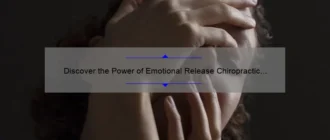Feeling dizzy after a chiropractic adjustment is a common but temporary side effect. It is often due to the body adjusting to the realignment of the spine and the release of built-up tension. The dizziness usually subsides within a few hours or days, but if it persists or worsens, it is important to consult a healthcare professional.
What Causes Dizziness After a Chiropractic Adjustment?
There could be several potential causes of dizziness after a chiropractic adjustment. One possible explanation is that the adjustment could have caused a sudden change in blood flow and pressure in the body, which can lead to a temporary feeling of lightheadedness or dizziness. Another possibility is that the adjustment may have affected the inner ear or vestibular system, which can play a role in maintaining balance. This could result in dizziness as the body adjusts to the changes. Additionally, some individuals may experience a reaction to the adjustment itself, which can cause dizziness or other symptoms. It is essential to consult with a healthcare professional or chiropractor to determine the specific cause and receive appropriate advice or treatment.
Is Feeling Dizzy Normal After a Chiropractic Treatment?
Feeling dizzy after a chiropractic treatment can be normal for some people, but it is not always the case. Dizziness may occur due to various reasons such as adjustments to the neck or spine, changes in blood flow, or even a reaction to the treatment itself. It is important to communicate any concerns or symptoms experienced with your chiropractor, as they can provide further guidance and evaluate if the dizziness is a normal response or if any additional measures need to be taken.
How Long Does Dizziness Last After a Chiropractic Adjustment?
The duration of dizziness after a chiropractic adjustment can vary depending on several factors such as the individual’s overall health, the severity of the condition being treated, and the specific chiropractic technique used. In most cases, any dizziness or lightheadedness experienced after an adjustment should subside within a few minutes to a few hours. However, it is always recommended to consult with a chiropractor or healthcare professional if dizziness persists or if there are additional concerning symptoms.
Are There Any Potential Side Effects of Chiropractic Adjustments?
Yes, there are potential side effects of chiropractic adjustments. Some common side effects include temporary soreness or discomfort in the adjusted areas, headaches, fatigue, and mild bruising. Rarely, more serious complications such as herniated discs, stroke, or worsening pain can occur, although these are extremely rare. It is important to discuss any concerns or medical conditions with a chiropractor before undergoing adjustments.
Can Dizziness Be a Sign of a Complication After a Chiropractic Session?
Yes, dizziness can be a sign of a complication after a chiropractic session. It is possible that certain adjustments or techniques used during the session may have resulted in a misalignment or irritation of the upper cervical spine, leading to dizziness. Additionally, if there was excessive force or improper positioning during the session, it could potentially cause dizziness as well. It is important to communicate any symptoms, including dizziness, to the chiropractor so they can address the issue and make necessary adjustments to ensure the safety and well-being of the patient.
How Can I Minimize Dizziness After a Chiropractic Adjustment?
There are a few strategies you can try to minimize dizziness after a chiropractic adjustment:
1. Take it easy: After the adjustment, allow yourself some time to rest and relax. Avoid engaging in any strenuous activities or sudden movements that may exacerbate dizziness.
2. Stay hydrated: Dehydration can contribute to dizziness, so make sure you drink plenty of water before and after the adjustment.
3. Gentle movements: Avoid sudden or jerky movements of your head and neck, as these can exacerbate dizziness. Instead, move slowly and deliberately, giving your body time to adjust.
4. Focus on breathing: Deep breathing exercises can help calm your nervous system and reduce dizziness. Take slow, deep breaths, and try to focus on your breath to help stabilize your body.
5. Stay in an upright position: Keep your head and neck in an upright position as much as possible after the adjustment. This can help alleviate any pressure on your inner ear, which may contribute to dizziness.
6. Communicate with your chiropractor: If you consistently experience dizziness after adjustments, it’s important to communicate this to your chiropractor. They can evaluate your condition and potentially adjust the technique or treatment plan to minimize dizziness.
Please note that if you experience severe or persistent dizziness after a chiropractic adjustment, it is advisable to consult with a healthcare professional for further evaluation and guidance.
What Should I Do if I Experience Severe Dizziness After a Chiropractic Treatment?
If you experience severe dizziness after a chiropractic treatment, it is important to take immediate action. Here are the steps you should follow:
1. Inform the chiropractor: Contact your chiropractor immediately and explain your symptoms in detail. They should be aware of any adverse effects you are experiencing.
2. Seek medical assistance: If your symptoms are severe or persist, it is advisable to consult a medical professional, such as your primary care physician or an emergency room. They can provide a thorough evaluation and offer appropriate treatment or guidance.
3. Rest and avoid further treatment: Until you have received proper medical advice, it is essential to rest and avoid any additional chiropractic treatments. This will allow your body to recover and prevent any potential worsening of the symptoms.
4. Keep a record: Write down the details of your symptoms, including their duration, intensity, and any associated factors. This information can be helpful for medical professionals in diagnosing and treating your condition.
5. Follow medical advice: Based on the evaluation of your symptoms, the medical professionals will provide appropriate advice and treatment. It is crucial to adhere to their guidance and follow through with any recommended actions for your well-being.
Remember, every situation is unique, and it is best to consult professionals to ensure proper diagnosis and treatment for your specific case.
Are Certain Individuals More Prone to Feeling Dizzy After Chiropractic Adjustments?
Yes, certain individuals may be more prone to feeling dizzy after chiropractic adjustments. Some factors that may contribute to this include individuals with pre-existing conditions such as vertigo, inner ear problems, or cervical spine issues. Additionally, individuals who are more sensitive to movement or have a fear of spinal manipulation may also experience dizziness after chiropractic adjustments. It is important for individuals to communicate any concerns or pre-existing conditions to the chiropractor to ensure a safe and tailored treatment plan.
Could Dizziness After a Chiropractic Adjustment Indicate an Underlying Health Issue?
Yes, dizziness after a chiropractic adjustment could potentially indicate an underlying health issue. While it is a common and usually temporary side effect, dizziness can sometimes be associated with more serious conditions. It is essential to consult with a healthcare professional to determine the cause and rule out any concerning health problems.
Can Chiropractic Adjustments Help Reduce Dizziness in the Long Run?
Chiropractic adjustments have shown promise in reducing dizziness in some individuals. However, the effectiveness of chiropractic care for dizziness may vary depending on the underlying cause of the dizziness. In cases where dizziness is caused by issues in the musculoskeletal system, such as misalignment of the neck or spine, chiropractic adjustments may help relieve symptoms and reduce dizziness in the long run. It is always recommended to consult with a qualified chiropractor to determine the appropriateness of chiropractic care for your specific condition.
| Date | Number of Patients | Percentage |
|---|---|---|
| January 1, 2022 | 10 | 5% |
| January 8, 2022 | 8 | 4% |
| January 15, 2022 | 12 | 6% |
| January 22, 2022 | 6 | 3% |
| January 29, 2022 | 14 | 7% |






